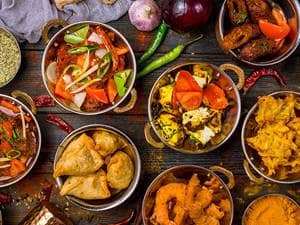
Hinduism does not tell Hindus that there are specific foods they cannot eat. In fact, most Hindu practices are not based around prohibited or permitted laws, but exist as a series of guidelines and instructions for Hindus trying to live spiritual and religious lives. In this way, most Hindus believe that different foods can be more, or less, helpful to a person's health and spiritual development on earth. Some foods in Hinduism are considered not ideal to eat from a spiritual perspective, and other foods are considered to be particularly healthy and to provide helpful spiritual energy.
One of the most important tenets of Hinduism is ahimsa, or respect for all living things, which includes not committing violence against other living things. This tenet demands that Hindus have compassion towards animals and all living things in nature. As a result, many Hindus try, as much as possible, not to hurt animals. This is one reason many Hindus practice a form of vegetarianism, including the avoidance of all meat, fish and eggs, though most will consume products derived from milk. Jhatka, a slaughtering technique in which the animal is killed with a single blow to the back of neck, is also the preferred form of slaughter for Hindus who do eat meat. This method is considered to cause the least trauma and stress for the animal, and thus be the least painful or spiritually harmful. The decisions about what to eat, and not eat, exist on a spectrum of behavior.
There are also many religious teachings in the long tradition of Hinduism which strongly advise against eating meat. One reason is that many Hindus believe that when a person consumes meat, they also consume the emotional pain and fear of the animal who was slaughtered, and this energy can have negative spiritual consequences for the eater. This belief is one of the reasons that Hindu religious leaders, priests, yogis, and others striving to achieve a higher plane of personal spirituality tend to practice a strict form of vegetarianism.
For Hindus who do choose to eat meat, some will still refrain from eating any kind of beef. This is because the cow is a beloved animal in Hinduism, and holds a special place of honor in the religion. Some say the honor given to the cow is because Krishna was a cow herder as a child, but the most common reason given for honoring the cow is because the cow is valued as a symbol of selfless giving. Cows provide humans with milk, which can be used for many foods, and this act of providing sustenance is considered worthy of respect and honor. Therefore, particularly in India, the cow is simply not considered a food animal. As a result, many Hindus who do eat meat will not eat meat derived from a cow.
In Hinduism, the types of food a person eats is considered to play an important role in the success of their spiritual pursuits. As a result, a variety of diets exist specific to Hindus who are focusing on their spiritual development, such as the sattvic diet. These diets are all vegetarian. Hindus who follow a specific religious diet will have more restrictions on what they can, and cannot, eat. For Hindus who do have restrictions on the foods they eat, the most common foods will include beef, meat in general, and sometimes other root vegetables or foods specific to a specific ritual practice. Hinduism as a religion, however, does not have specific foods that all Hindus are forbidden from eating.
12/15/2022 4:46:37 AM










